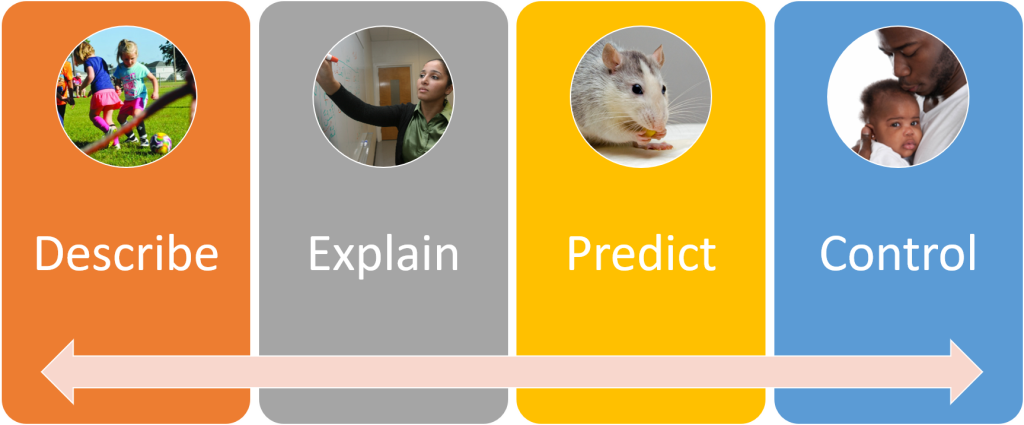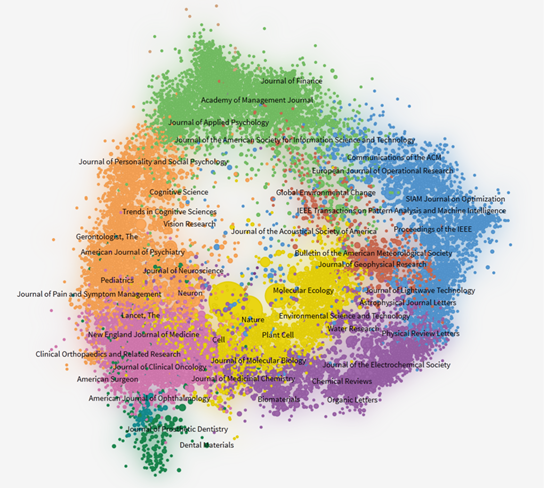1.1 Introduction to Psychology
L D Worthy; T Lavigne; and F Romero
Before we begin talking about culture and psychology, it is important to have a basic understanding of the field of psychology. Broadly speaking, psychology is the science of behavior and mind, including conscious and unconscious phenomena, as well as feeling and thought. Psychologists, practitioners or researchers in the field, explore the role that cognitive processes (thinking) has on individual and social behavior. Psychologists also explore the physiological and biological processes (e.g., neurotransmitters, brain, and nervous system) that underlie the thinking and behavior of individuals.
There are four main goals of psychology:
Describe
Psychologists describe the behavior of humans and other animals in order to improve our understanding of the behavior and get a sense of what can be considered normal and abnormal. Psychological researchers use many different methods to help describe behavior including naturalistic observation, case studies, and surveys. After describing behavior, it is easier for psychologists to understand and explain the behavior.
Explain
This goal involves determining the causes of behavior. Psychologists try to understand why a person acts or reacts in a certain way and then they try to identify if there are other factors that may produce the behavior (e.g., something that happens before or after a behavior). Using experimental designs, psychologists establish theories which will help explain the same behavior in different situations and contexts.
Predict
The third goal of psychology is to predict what behavior will come next, how a person will behave or when will the behavior happen in the future. Predicting behavior is hard, unless the behavior has already been studied which is why describing and explaining behavior must happen first. A psychologist may be able to predict a behavior by looking for a pattern using past instances or examples of that behavior. Predicting behaviors is essential for psychologists if they want to change or modify harmful or dysfunctional behaviors or to promote or encourage positive or prosocial behaviors among individuals.
Control
Finally, and perhaps most importantly, psychology strives to change, influence, or control behavior to make positive and lasting changes in people’s lives. It is important to note that if a psychologist tries to influence, shape, modify or control someone’s behavior without asking permission or getting consent it is considered unethical. As noted earlier, the ultimate goal of psychology is to benefit individuals and society but we do this by respecting the rights of others.

Psychology has been described as a “hub science” which means that medicine tends to draw upon psychological research mainly through the fields of neurology and psychiatry. Social sciences commonly draw directly from sub-disciplines within psychology like social psychology and developmental psychology. The field of psychology is about understanding and solving problems in several areas of human activity and as a discipline psychology ultimately aims to benefit society.
Despite its ultimate aim to benefit society, the psychological aspects of culture have historically been overlooked because many elements of culture cannot be observed. For example, the way that gender roles are learned is a cultural process, as is the way that people think about their own sense of duty toward their family members. Also, there has been an overrepresentation of research conducted using human subjects from Western, educated, industrialized, rich and democratic nations (WEIRD). Findings from psychology research utilizing primarily W.E.I.R.D. populations are often labeled as universal theories that explain psychological phenomena but are inaccurately, and inappropriately, applied to other cultures.

Recent research findings revealing that cultures differ in many areas, such as logical reasoning and social values has become increasingly difficult to ignore. For example, many studies have shown that Americans, Canadians and western Europeans rely on analytical reasoning strategies, which separate objects from their contexts to explain and predict behavior. Social psychologists refer to the fundamental attribution error or the tendency to explain people’s behavior in terms of internal, inherent personality traits rather than external, situational considerations (e.g. attributing an instance of angry behavior to an angry personality). Outside W.E.I.R.D. cultures, however, this phenomenon is less prominent, as many non-W.E.I.R.D. populations tend to pay more attention to the context in which behavior occurs. Asians tend to reason holistically, for example by considering people’s behavior in terms of their situation; someone’s anger might be viewed as simply a result of an irritating day (Jones, 2010; Nisbet et al., 2005). Yet many long-standing theories of how humans think rely on the prominence of analytical thought (Heinrich, 2010).
By studying only W.E.I.R.D. populations, psychologists fail to account for a substantial amount of diversity of the global population. Applying the findings from W.E.I.R.D. populations to other populations can lead to a miscalculation of psychological theories and may hinder psychologists’ abilities to isolate fundamental cultural characteristics.
A major goal of cultural psychology is to have many and varied cultures contribute to basic psychological theories in order to correct these theories so that they become more relevant to the predictions, descriptions, and explanations of all human behaviors, not just Western ones (Shweder & Levine, 1984).

